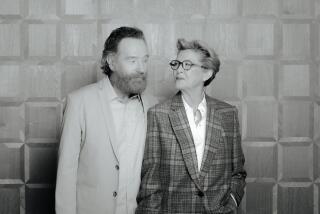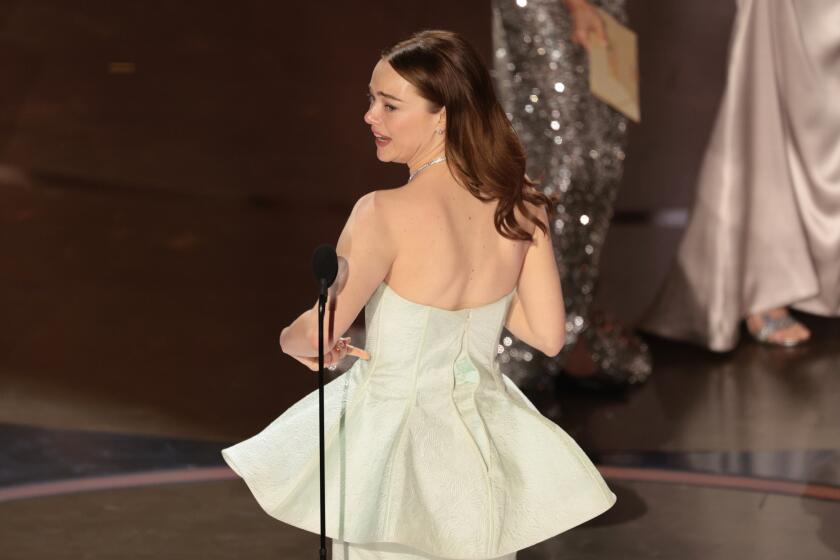As a father, actor and director
Tim Roth was beat; he had just finished a long day of interviews for “Youth Without Youth,” the long-awaited film by Francis Ford Coppola that opened Friday. And he was already thinking ahead to “Funny Games,” coming in March, in which he and Naomi Watts play Hamptons parents who are taken hostage in their home by two savage young pranksters; Roth’s character spends much of the movie in agony.
Did your (journalist) dad ever give you tricks of the trade to deal with journalists?
The one thing he did say was: Watch out for the pause. They’ll ask a question and they’ll leave a gap. . . . It’s a trap.
It’s fantastic advice.
Of course.
[Pause]
It’ll encourage me to lie.
At the Angelika [Film Forum in New York] last night, they showed a preview for Michael Haneke’s “Funny Games” and I broke out in a cold sweat.
That’s horrible.
I thought I was going to vomit.
Yeah, it’s a tough one. It was a very hard film to make. I like Michael very much, but I found it so distressing being involved in that movie. That child is the same age as one of my children. I’m not going to see it -- I seldom watch what I do -- but I’m hoping it’s not exploitative. I hope it serves a purpose.
Michael Pitt [who plays one of the home invaders in the film] said of making the movie: “There are things you can do to make sure you’re not the one being terrorized. Or at least give as much back. Michael Haneke was the father of the house.”
Yeah. I think Michael Haneke found it very difficult -- because he had that communication issue. [Haneke is Austrian.] We have a shorthand in our own language, and nuance is a very important part of communications, and he was stripped of that. So a flat translation of what someone said is not what they mean. And it was frustrating as hell for him. . . . I found that to be unable to protect, unable to leap in, to be weakened to that extent that you cannot protect what you love, very hard. A very, very hard movie to make. I hope people like it or will respond to it. There were two films: the film that Pitt and Brady [Corbet, the other invader]were in, and then there was our film. Our film tended towards realism, and theirs didn’t, and the two things met in that house. It was a complicated experience. I lived through it.
You’ve said you hated your performance in “The Cook, the Thief, His Wife and Her Lover.”
It’s not so much that I hated my performance; it’s just that I just don’t watch. I’ve reached a point where I find it unbearable. Plus, I’m not seeing the film, I’m remembering what that day was. You can’t connect in the way an audience can. So in a sense it’s enough already, I know what I look like. I think the experience of making the film is the most important aspect. It’s a director’s medium, not an actor’s medium. And my job is to give it as good an impersonation of what’s going on in the director’s head as I can imagine.
And are you directing again?
I’m hoping to! [But] I’ve got kids to put through college. And the things I want to direct probably won’t pay me well. I have two scripts ready, and one of them is Manhattan-based and I’m very keen to do it. And it’s the question of finding the right time and financing.
You said a while back that you’d use the same team from your last film [“The War Zone,” 1999].
I think the same crew for this one. And then some of the same actors for the next one. But this one, it’s a Manhattan piece and it requires a different cast. But the same cinematographer, I hope, and the same editor and producer too.
So you are close!
Yup! I hope so.
That was an amazing film.
It was the best time I ever had as a filmmaker. You finally get to make a film that is yours. Every film you make as an actor it’s not yours, it’s the director’s. Finally I get to say what I like about what happens in a frame; composition, light, the kind of performance that I like.
Tell everything you can about the next Quentin Tarantino film [“Inglorious Bastards.”]
I can’t, really! What I can tell you is that it’s something Quentin and I discussed way back. A director can be enthusiastic about something and about you being in it, and when they get to do it, they’ve moved on, had other ideas. And that’s perfectly fine. And proper. But then it surfaced again through journalists asking me. And I obviously love working with Quentin and would do it again. But there’s never been a conversation past our private kind of talks we’ve had over the years about it. I’m ready to go if he wants me to go. Not a problem.
More to Read
Only good movies
Get the Indie Focus newsletter, Mark Olsen's weekly guide to the world of cinema.
You may occasionally receive promotional content from the Los Angeles Times.






